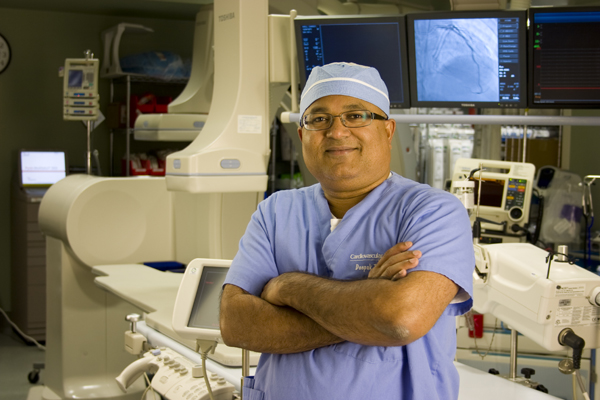Article provided courtesy of Lane Regional Medical Center

Dr. Deepak Thekkoott, Lane RMC
If heart attacks really happened as they are portrayed in the movies – the sudden, intense chest pain that brings you to your knees — it would be easier to know when to go to the hospital. But in reality, the pain and discomfort caused by a heart attack can be more subtle, especially for women.
Heart attacks are the leading killer of both men and women in America. Waiting for symptoms to subside could result in an undesirable outcome. A heart attack happens every 34 seconds in America, affecting more than a million people each year. More than a third of them pass away.
"If you're having a heart attack, prompt medical attention may help protect your heart muscle from permanent damage, and perhaps save your life," says Interventional Cardiologist Dr. Deepak Thekkoott.
"The medical term for heart attack is myocardial infarction. A heart attack occurs when the blood that brings oxygen to the heart muscle is blocked, often by a blood clot. A less common cause of a heart attack is a coronary artery spasm that restricts blood flow. Without oxygen, heart muscle cells begin to break down. A heart attack can cause permanent damage to the heart, impairing its pumping ability. However, survival rates are favorable for those who seek immediate medical attention."
A heart attack may be the first sign of coronary artery disease (CAD) which can be caused by plaque build-up. CAD narrows or blocks the arteries and increases the likelihood of developing blood clots. In addition to heart attacks, CAD can lead to other medical problems including angina, which causes chest pain and discomfort, or arrhythmia which is an irregular heartbeat. Over time angina can weaken the heart muscle and cause heart failure.
Heart attack symptoms can range from mild discomfort to gripping pain. Many people put off seeking medical attention, blaming indigestion or not recognizing the signs. Seek medical attention immediately if you experience any of these heart attack symptoms:
•A mild to severe feeling of pressure, squeezing, fullness or pain in the center or left side of the chest that lasts more than a few minutes or goes away and comes back
•Discomfort in one or both arms, the back, neck, jaw or upper part of the stomach
•Shortness of breath, with or without chest discomfort or pain
•Nausea, vomiting, light-headedness or sudden dizziness
•Cold sweats
•Unusual or unexplained fatigue
Chest pain or discomfort is the most common sign of heart attack in both men and women. However, women are more likely than men to experience the less obvious symptoms. As soon as heart attack symptoms begin, research shows that chewing an aspirin can be beneficial since this common drug has an anti-clotting effect in the bloodstream. Once medical help is at hand, avoid losing precious treatment time. Immediately tell the ambulance or emergency room personnel that you think you may be having a heart attack. To determine if a heart attack is in progress or has occurred, your vital signs will be monitored and imaging or blood tests will be done if necessary. Treatment might include drugs, heart bypass surgery or other procedures aimed at restoring proper blood flow. If you're very lucky, you may come away with just a prescription for a more heart-healthy diet and active lifestyle.
For a full cardiovascular check-up, contact Cardiovascular Institute of the South, 225-654-1559.
0 comments